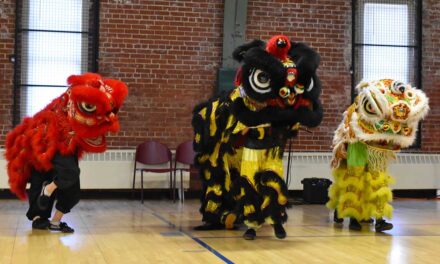Published in the April 11, 2018 edition
By MARK SARDELLA
WAKEFIELD — Author and historian Rick Beyer had some sobering words about the Founding Fathers of our country.
“These guys were not much different than our politicians of today,” Beyer told last night’s Sweetser Lecture audience. “They were filled with jealousy, ambition, anger and ego. They were flawed human beings and yet they still managed to create the framework of the United States.”
Beyer was at The Savings Bank Theatre to talk about the subjects of his latest book, “Rivals Unto Death: Alexander Hamilton and Aaron Burr.” Hamilton and Burr were participants in the most famous duel in American history – one that Hamilton did not survive. The musical, “Hamilton,” Beyer noted, has spurred renewed interest in this pair of early American adversaries.
Beyer is a bestselling author, an award-winning documentary producer and a long-time history enthusiast. His award-winning documentary “Ghost Army” premiered on PBS in 2013. He is the author of the popular series of history books, “Greatest Stories Never Told.”
For 90 minutes last night, Beyer took the audience back to the turn of the 19th century, to a United States in its infancy.
With his political career already on the skids before the duel, Beyer said, Hamilton in death was turned into a martyr. Meanwhile, “Burr is portrayed as one of the twin bad boys of early American history – Benedict Arnold and Aaron Burr.”
But it’s not that simple, Beyer pointed out, noting that Burr graduated from Princeton at age 16. He was a war hero and “in many ways a very admirable character.”
Beyer discussed the men’s interactions over the dozen or so years that led up to the fateful duel. After the Revolution, both men knew each other as practicing lawyers in New York City when the population was about 15,000. Beyer said that the men had vastly different styles in the courtroom. Hamilton was combative, while Burr was more urbane and tended to tap into the emotions of jurors.
He quoted one contemporary observer. “Hamilton appealed to the head, while Burr enslaved the heart.”
Each man became involved in politics. Hamilton co-wrote “The Federalist Papers” and became Secretary of the Treasury. Burr served as New York Attorney General and later as a U.S. Senator from New York. He would become Thomas Jefferson’s vice president.
But the two men saw politics through different lenses.
“Hamilton viewed politics as a sacred mission,” Beyer said, whereas Burr viewed politics as a career path with flexible allegiances in which the only object was success. Hamilton was a Federalist while Burr was a Democratic-Republican. Beyer reviewed the ups and downs of the Hamilton-Burr rivalry, which may have come to a head in their respective roles in the presidential election of 1800.
Beyer called it “one of the wildest elections in American history.” President John Adams was running for re-election against challenger Thomas Jefferson. But, through a quirk in the Electoral College, the election ended in a tie – not between Adams and Jefferson, but between Jefferson and his vice-presidential running mate, Aaron Burr.
That, Beyer explained, meant that the election was thrown to the House of Representatives, where the vote remained deadlocked through 33 ballots – until Alexander Hamilton convinced one congressman to switch his vote to Jefferson.
That action likely got back to Burr, and the downward spiral continued when Hamilton continued to speak ill of Burr, culminating in their duel on July 12, 1804.
Beyer said that it’s impossible to know who fired the first shot. Burr claimed that Hamilton shot first but Hamilton’s aide insisted that Burr fired first. Beyer said that more than 200 years later, the truth remains elusive. He said that in his book he lays out the known facts and lets the reader decide.
Beyer pondered what might have been if the men had come to some accommodation and the duel had been avoided. He noted that, while each man’s political career seemed to be stalled, they were both still in their 40s. American political history is full of comebacks, Beyer observed, and one or both might have eventually become president.
But it was not to be.
Hamilton and Burr were “so consumed by animosity and jealousy and conceptions of honor,” Beyer observed, “that both men ended up losing that day.”





